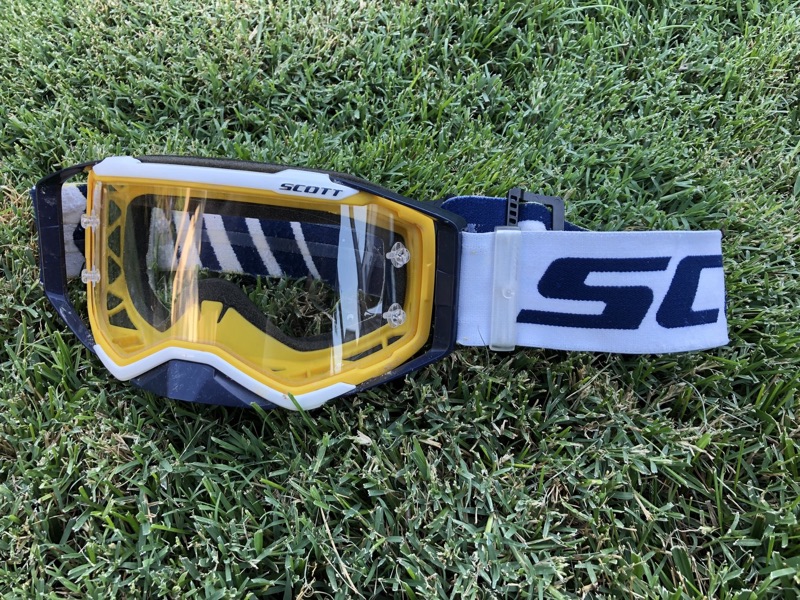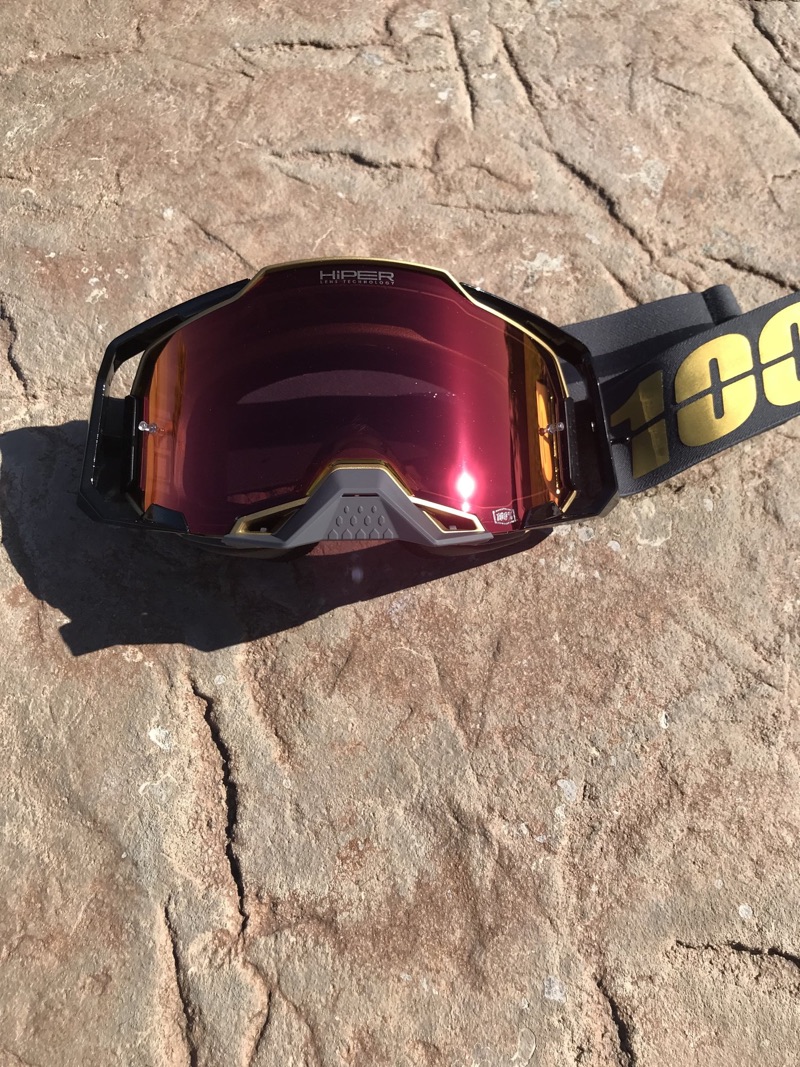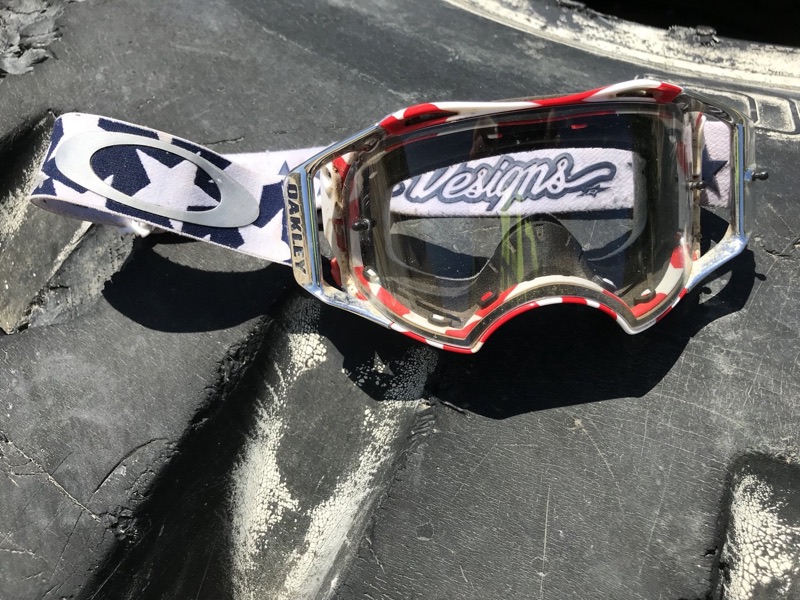Share This Article
As Matthes and I were driving home from riding one day he suggested that I do a goggle shootout. This sounded like something right up my alley since I have spent so much time in three specific pairs of goggles as of late: The Oakley Airbrake, Scott Prospect, and 100% Armega goggles have seen their fair share of riding time the past few months, so I thought could break down the positives and negatives of each one and compare them against each other. At the time of this test EKS Brand didn’t have their new wide peripheral goggle ready, so that is why they are NOT in this shootout, so don’t yell at me Steve!
Criteria Breakdown: I went through several helmets while executing this shootout to ensure these goggles fit in the most common North American helmets. Each goggle was worn wearing a Shoei VFX-Evo, Arai VX-Pro4, Alpinestars M10, 6D ATR-2, Fly Formula, Bell Moto 9, and Fox V3. At the bottom of each goggle’s description is a rating for some key categories of each goggle for you to digest as well as pick which one you may like best. The rating chart is a ranking from 1-10. “1” being very poor and “10” being excellent. It’s up to you to decide which one fits your budget and type of riding based on the information that is given. If you have any questions about these goggles please email me at kris@keeferinctestnig.com. As always we keep an open door testing policy.
Scott Prospect:

Scott USA has been in the motorsport goggle industry for just over 40 years and have had the Prospect out for a few years now. A complete redesign from their top tier goggle “The Hustle”, the Prospect was in development for nearly two years. Some of the standout features of the Prospect is a polycarbonate lens that is 1mm thick (versus 0.8mm thick like the Oakley Airbrake lens), the Scott lens locking system that consists of four locking pins that secure the lens to the frame of the goggle for safety (instead of feeding the lens into a groove and securing it with tabs), a wider frame, an updated two position outrigger system that did fit a wide range of helmet sizes, a No Sweat 3.2 foam, and a wide strap for optimal grip to the helmet. The lens of the Prospect is not injected molded like the Armega and Airbrake, but still is very tough in its own right. I have yet to have a rock pop any lens out on me over my years of racing/testing, but to say that it can’t happen would be foolish. Having an injected molded lens almost assures that this will NEVER happen.
I am kind of a pain in the ass when it comes to comfort with goggles and the Prospect goggle was the only goggle (out of all three) that took me more time to get used to. Much like a pair of new boots, the Prospect has a unique feel. The way the foam (near the nose area) is cut out doesn’t quite wrap around my nose like the other two pairs of goggles.The nose area of the the Prospect is wide and sits more near the bottom of my nose rather than on the bridge. That is exactly why it took some time for me to get used to them. Speaking of the foam however, the No Sweat 3.2 foam against my face feels plush and soaks up enough of my sweat that it doesn’t drip inside the goggle on very hot days in the desert. There was no need to purchase any maxi pads products to add to the top of the goggle’s foam as it soaked up sweat adequately. The field of vision is very similar to the Oakley Airbrake and Armega as the Prospect goggle is as wide as its competitors. It is however not so wide that it didn’t fit/seal in the helmets used in this shootout. Compared to the others, the Prospect will ride down almost to the edge of my nose and I have a large nose. Adjusting it to your face is key and I found the best way to get it to ride a little higher up on my nose was to get the goggle strap extra tight and to remove the nose guard that the Prospect comes with. Doing this would allow the goggle to ride a little higher on my face and give me less pressure on the wider part of my nose. It didn’t affect the way it sealed to my face after doing so, but it did take a little longer than usual to find a way to position it correctly. So if you feel like the Prospect is riding a little low on your nose, try tightening the goggle strap a little more than you normally would.
Changing lenses out on the Prospect is fairly painless, but not better than the 100% or Oakley. You can switch lenses out by popping two locking pins out on top of the frame and two at the bottom. Once those are popped out, the lens comes out easily and I was able to stick another lens in under two minutes, not the fastest, but not horrible! I wore the Prospect on a couple long tests at open tracks days and the four-post tear off design takes a little more of a tug to rip them off. However the way the tear offs lay and fold onto themselves makes it easy NOT to pull more than one at a time. The Scott Prospect tear off design gives you enough tail that you can feel it easily with gloves and rip only one tear off.
With the Scott Prospect goggle’s pricing (around $80.00 vs. a $160.00 Airbrake) you actually afford a couple pairs. I would also be getting the same wide peripheral vision and almost the same comfort as an Airbrake. I say “almost” because of the low nose area with the Scott’s. The Airbrake and Armega frame fit better to my face (bridge of nose area sets higher up on my nose) and has zero issues with riding low on my nose like the Prospect’s do. However, the Airbrake’s have been known to fog up on me on colder days, but the Prospect’s and Armega’s haven’t. The lens on the Prospect is resilient to getting scratched and is probably the toughest lens in the group. I could wipe the Prospect lens with my glove while riding and it wouldn’t get nearly as scratched as an Airbrake and Armega lens.
For around $80.00 I would consider this a very good goggle for the price. The field of vision, the comfort of the foam against my face, ease of finding the end of the tear off to pull efficiently, and the lack of fogging makes it a great purchase. Setting up the goggle to fit up to your face might take you a couple rides to get comfy, but once you do you will agree that this is the best goggle Scott USA has made yet.
Goggle Price: $80.00
Bonus Lens: Yes
Replacement Lens Price: $10.00
Weight: 138 Grams
Fogging Issues: No
Laminate Tear Off’s: Yes
Rating Chart:
Ease Of Replacing Lenses: 5
Lens Clarity: 7
Field Of Vision: 9
Fitment In Helmet: 8
Foam Feel/Absorption: 8
Overall Comfort/Fit On Face: 6
Ease Of Ripping Tear Offs: 9
Positives:
-
Lens toughness
-
Great price for a wide peripheral goggle
-
Sweat absorption
Negatives:
-
Not the quickest for replacing lenses
-
Fit takes some time to get used to
-
10 or more tear off’s clarity/vision is distorted more than Airbrake
100% Armega:

I will be the first one to admit that the older 100% goggles were not my “go to” goggles. They pinched my nose and the clarity of the lens wasn’t my favorite. The new Armega goggle has changed my thought process about grabbing a pair to ride with for the week.The 3D modeled lens – this is a polycarbonate material that is specifically designed to have zero optical distortion. There are no imperfections in these lenses which means you can focus on the imperfections on the track instead. Furthermore, their premium lens offering is called HiPER technology which helps contrast red/blue/green color spectrums to really enhance what you are looking at. The best way for me to summarize this is that it almost feels like polarized sunglasses – what you are looking at just seems to pop more. Part of their marketing for the Armega goggle is “Ultra HD Vision” – now I’m not quite sure what to make of that slogan, but know that you might only really notice this HD vision when wearing an Armega goggle that has the HiPER lens in it. This lens technology is however still just behind the Oakley Airbrake Prizm lens in clarity. When wearing a stack of 14 laminate tear offs on the Armega lens, it does become clear that the Airbrake is the favorite when it comes to stacking tear offs for a long moto.
The ventilation system they designed for the Armega is also interesting. There are two induction ports on either side of the nose guard that help force air into the frame of the goggle. This air is funneled right into the foam layers (which are perforated by the way) with the intentions of eventually reaching your face. 100% had the goal of maximizing airflow for hot days and also for the cold days – because on the cold days, the more air you have flowing inside the goggle, the less likely they are to fog up. The Armega is the best no fog goggle in the group, so if you’re a cold rider weather rider these goggles would be my first choice. To tie this ventilation design together, they integrated a sweat channel into the upper part of the frame. This channel forces your sweat away from the lens and out of the goggle on either side of the frame. This is something that I got to test a little while racing the past couple weeks and I can tell you that sweat still in deed does find its way into the inside of my lens. Although it didn’t distort vision while racing, you could visually see the perspiration on the lens itself. There isn’t a goggle in this shootout that eliminates sweat completely from dripping inside your lens. The Armega does it very well, but DOES NOT eliminate it completely.
The Armega goggle has the second best lens clarity of the bunch and resistance to scratching is very good (much better than that of the Airbrake). Most importantly the nose area of the Armega fits my big ass nose well and doesn’t leave a pinching sensation or blisters like their old goggle did. The foam is soft to the skin and fits in every helmet I tested, which I can appreciate because I wear so many different types of lids when performing bangers for social media. Changing the lens is also much easier than the Prospect and on par with the Airbrake so that is a welcome addition to the Armega. The pricing of the Armega is $120.00 (with the HiPER lens) so it’s slightly more expensive than the Prospect. Without the HiPER lens (clear) the cost goes down $20.00. If you’re wondering, yes, the clear lens to me is still very HD like.
Goggle Price: $120.00
Bonus Lens: No
Replacement Lens Price: $25.00 clear $55.00 HiPER Red Mirror
Weight: 141 Grams
Fogging Issues: No
Laminate Tear Off’s: Yes
Rating Chart:
Ease Of Replacing Lenses: 8
Lens Clarity: 8
Field Of Vision: 9
Fitment In Helmet: 8
Fitment On Face: 8
Foam Feel/Absorption: 9
Overall Comfort/Fit On Face: 8
Ease Of Ripping Tear Offs: 6
Positives:
-
Lens clarity
-
Fit/Feel
-
Sweat absorption
Negatives:
-
Sticky tear off posts
-
Feels heavier than other goggles
-
Price of HiPER lens
Oakley Airbrake:

Oakley took a different approach to the goggle market when developing the Airbrake goggle back in 2013. They used different technology and put a pricepoint out there that most consumers just disregarded. In fact, I was one of those people! There was no way I could justify spending $160-200 bucks on a pair of goggles. Fast forward to today and wide peripheral, rigid frame, higher priced, HD lens goggles are the norm. Hence this shootout! The beauty of the Airbrake is the speed of changing lenses and clarity of the lens technology. The Switchlock system is the best in the shootout and really relieves any headache of several lens changes. There are two lugs that center the lens on the frame and the levers lock it in place, that’s it! The PRIZM technology is similar to 100%’s HiPER technology and are very similar looking when riding, but comparing clear lens to clear lens the Oakley Airbrake simply has more clarity. Vision and field of view are also the best in class. I get a slightly wider peripheral view when riding, but it’s only very minimal and may not be noticed by others, but since I have had so many back to back days with all of these goggles, I can nitpick this a little more. The Oakley’s frame fits into all the helmets we tested in and sealing was never an issue. The face foam is comfortable as well as thick that can soak up a good amount of sweat before dripping into the lens. Yes, they still drip into the lens!
The ventilation on hot days is superb, but on colder days the lens has a tendency to fog up the worst of any goggle in the shootout. I also notice that my eyes get watery on faster tracks due to the amount of airflow that come through the vents. This could be where the ports are placed on the frame and flow the air into my face. This was only felt on extreme fast GP style tracks. Do yourself a favor and possibly seal the vents with a light coating of baby oil if you’re riding dusty or very fast conditions to keep your eyes from watering. On normal motocross style tracks this was a non-issue.
The lens itself is very delicate and can’t take much abuse. I seem to scratch both PRIZM and clear lenses easier on the Oakley Airbrake than the Armega or Prospect. You will have to make sure to leave a tear off on the lens of the Airbrakes if you want to extend the life. The overall fit and feel of the Airbrake feels lighter and more compact even though the numbers on paper don’t say much. Lastly, let’s cut to the large elephant in the room shall we… The price! At $160.00-200.00 they are the most expensive in the shootout and that is a turn off with consumers. However, if you’re looking for the best feel against your face and lens clarity that is second to none then this goggle is the ticket. If you’re an off-road guy that rides slower terrain in colder conditions this wouldn’t be my first choice, due to the fogging issues I have had (even with a no fog cloth).
Goggle Price: $160.00-$200.00
Bonus Lens: No
Replacement Lens Price: $25.00 clear $50.00 PRIZM lens
Weight: 135 Grams
Fogging Issues: No
Laminate Tear Off’s: Yes
Rating Chart:
Ease Of Replacing Lenses: 9
Lens Clarity: 9
Field Of Vision: 9
Fitment In Helmets: 9
Fitment On Face: 9
Foam Feel/Absorption: 9
Overall Comfort/Fit On Face: 9
Ease Of Ripping Tear Offs: 8
Positives:
-
Simple to swap lens out
-
Fit/Feel
-
Clarity with several tear offs installed
Negatives:
-
Lens scratches easily
-
Price
-
Fogging issues
